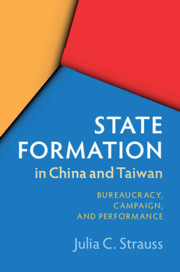Book contents
- State Formation in China and Taiwan
- State Formation in China and Taiwan
- Copyright page
- Dedication
- Contents
- Figures
- Acknowledgments
- Introduction
- 1 Virtue and Talent in Making Chinese States
- 2 Comparative Terror in Regime Consolidation
- 3 Performing Terror
- 4 Repertoires of Land Reform Campaigns in Sunan and Taiwan, 1950–1954
- 5 Theaters of Land Reform
- Conclusion
- Book part
- Documentary Collections, Reports, and Periodicals
- Bibliography
- Index
1 - Virtue and Talent in Making Chinese States
Heroes and Technocrats in Sunan and Taiwan, 1949–1954
Published online by Cambridge University Press: 13 October 2019
- State Formation in China and Taiwan
- State Formation in China and Taiwan
- Copyright page
- Dedication
- Contents
- Figures
- Acknowledgments
- Introduction
- 1 Virtue and Talent in Making Chinese States
- 2 Comparative Terror in Regime Consolidation
- 3 Performing Terror
- 4 Repertoires of Land Reform Campaigns in Sunan and Taiwan, 1950–1954
- 5 Theaters of Land Reform
- Conclusion
- Book part
- Documentary Collections, Reports, and Periodicals
- Bibliography
- Index
Summary
All states need competent and loyal state administrators to both reflect the state and implement its policies. Although the People’s Republic of China in Sunan and the Republic of China in Taiwan were unalterably politically opposed to each other, the ways in which they labeled and conceived of their administrators exhibited surprising overlaps. Both used ganbu (cadre) alongside more neutral terms like civil servant or state personnel in the early 1950s. Both presumed that individuals in state service needed to exhibit “virtue” (loyalty and engaging in work in the “right” way), “talent” (functional and technical competence) and continuous self-cultivation. The two regimes diverged in how they fostered these positive attributes in their state administrators: the PRC in Sunan sent thousands for party-mandated training, and selected “talent” according to enthusiasm and conducting campaigns in the right way while the ROC in Taiwan was enamoured of regular systems of examination and annual evaluation for entry and promotion.
- Type
- Chapter
- Information
- State Formation in China and TaiwanBureaucracy, Campaign, and Performance, pp. 34 - 75Publisher: Cambridge University PressPrint publication year: 2019

